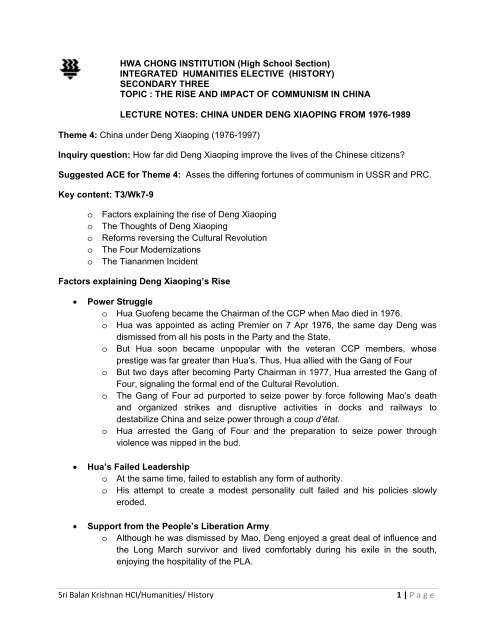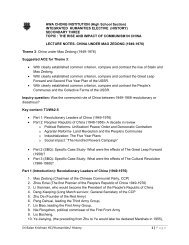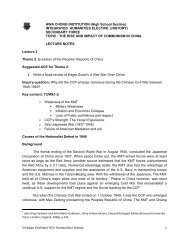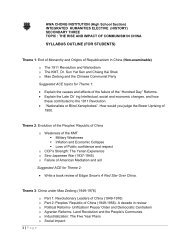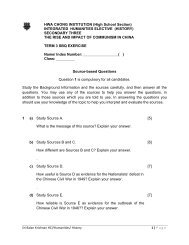Lecture 7.pdf - Hwa Chong Institution
Lecture 7.pdf - Hwa Chong Institution
Lecture 7.pdf - Hwa Chong Institution
- No tags were found...
Create successful ePaper yourself
Turn your PDF publications into a flip-book with our unique Google optimized e-Paper software.
HWA CHONG INSTITUTION (High School Section)INTEGRATED HUMANITIES ELECTIVE (HISTORY)SECONDARY THREETOPIC : THE RISE AND IMPACT OF COMMUNISM IN CHINALECTURE NOTES: CHINA UNDER DENG XIAOPING FROM 1976-1989Theme 4: China under Deng Xiaoping (1976-1997)Inquiry question: How far did Deng Xiaoping improve the lives of the Chinese citizens?Suggested ACE for Theme 4: Asses the differing fortunes of communism in USSR and PRC.Key content: T3/Wk7-9oooooFactors explaining the rise of Deng XiaopingThe Thoughts of Deng XiaopingReforms reversing the Cultural RevolutionThe Four ModernizationsThe Tiananmen IncidentFactors explaining Deng Xiaoping’s Rise• Power Struggleo Hua Guofeng became the Chairman of the CCP when Mao died in 1976.o Hua was appointed as acting Premier on 7 Apr 1976, the same day Deng wasdismissed from all his posts in the Party and the State.o But Hua soon became unpopular with the veteran CCP members, whoseprestige was far greater than Hua’s. Thus, Hua allied with the Gang of Fouro But two days after becoming Party Chairman in 1977, Hua arrested the Gang ofFour, signaling the formal end of the Cultural Revolution.o The Gang of Four ad purported to seize power by force following Mao’s deathand organized strikes and disruptive activities in docks and railways todestabilize China and seize power through a coup d’état.o Hua arrested the Gang of Four and the preparation to seize power throughviolence was nipped in the bud.• Hua’s Failed Leadershipo At the same time, failed to establish any form of authority.o His attempt to create a modest personality cult failed and his policies slowlyeroded.• Support from the People’s Liberation Armyo Although he was dismissed by Mao, Deng enjoyed a great deal of influence andthe Long March survivor and lived comfortably during his exile in the south,enjoying the hospitality of the PLA.Sri Balan Krishnan HCI/Humanities/ History1 | P age
o Through the support of the PLA, Deng reappeared as the one of the five vicechairmenof the CCP.• Deng’s experience and influenceo By 1978, Deng was in a position to gain the CCP’s approval for his policies.o This was so because of his authority derived from this status as the originalmember of the revolutionary generation.o Also, Deng had connections with all sectors of the society, not just the PLA.o Unlike Mao who never left China after 1945, Deng hade more worldlyexperience, travelling and working in France and the Soviet Union.o Hence, Deng was able to push aside Hua Guofeng, the little known securityofficial from Hunan Province.o Deng’s disciple, Hu Yaubang and the youngest Long March survivor was able tosideline Hua and became the Party General Secretary, with the reform mindedZhao Ziyang become the Prime Minister of China.o Thus, by 1980, the Chinese state was staffed with Deng’s supporterso By June 1981, Deng became the undisputed leader of China to execute hispolicies.Post Mao-Reforms• Reinforcing his authority during the Cultural Revolution, Mao pursued his Utopian andEgalitarian dream of “never ending class struggle” based on the Stalinist model of statecontrol of economy, collectivization of agriculture and the emphasis on heavy industries.This model produced a “faltering economy” for China, with 250 million people living inpoverty in 1978. 1• In the post-Mao era, China transformed form “an isolated, poor, rural and politicallyturbulent country, decimated by the Cultural Revolution, into a relatively open, stable,urbanizing and modernizing nation.” 2 This is attributable to the reforms of DengXiaoping.Deng Xiaoping’s Thoughts• Deng’s political thought can be best summarized in his own words, “It does notmatter whether a cat is white or black, so long it catches mice.”• This encapsulates his ideological stance of pursuing pragmatism.• His reforms programs have been called, “socialism with Chinese characteristics”, thiswas aimed at moving to a market economy and into International arena, withoutcompromising the existing Communist Party-state.1 Ibid., p.406‐407.2 John King Fairbank and John Merle Goldman, China A New History. (Second Enlarged Edition)(Harvard UniversityPress: London, England, 2006), p.406.Sri Balan Krishnan HCI/Humanities/ History2 | P age
Deng Xiaoping’s Reforms• Deng’s first action was to reverse the Cultural Revolutiono Ended the Maoist “Cult of Personality” and introduced term limits to the highestpositions of the CCP.o Revolutionary committees that were set up to run local government wasabolished and replaced with democratically elected groups.o Property confiscated from former capitalists were returned to survivors.o More religious freedom and intellectual freedom was granted.• Agricultural reformso Deng firmly held that the support for the CCP comes from the 80% of thepopulation that lived in the countryside.o Deng moved away from Stalinist farm collectivization to family farms thoughprogressive land reforms. He also adopted the East Asian farming methods andinvolving in international trade (i.e. selling the farm produce and surplusesinternationally).o Consequently, the countryside became the most dynamic sector of China’seconomy, due to the progressiveness introduced by Deng’s reforms.o With Prime Minister Zhao Ziyang’s reforms in 1979, the state farms were givenmore autonomy over planning and financing and profit. Bonuses and profitsharingschemes and introduced, which cumulatively improved the livelihood ofpeasants with many becoming prosperous.• The Four Modernizationso Deng’s Four Modernizations targeted (1) Industry; (2) Agriculture; (3) Scienceand (4) Technology.o Towards this end, loans were procured from foreign banks and governments.o China also joined the IMF and the Word Bank to procure loans to purchasemodern machinery to replace the outdated machinery used by the Chinesefactories.• Deng wanted to stimulate domestic consumption, therefore changed thefocus from heavy industries, to light industries producing consumer goodslike, clothing, bicycles, electric appliances, aimed at improving thestandard of living of the Chinese people.• More factories were set up towards this end, and individual factorymanagers were given more freedom in decision making to encouragemore production.oBy the late 1980s, China with the absorption of Western Science and Technologybecame modern state, with advanced telecommunications (telephone/ internet/Sri Balan Krishnan HCI/Humanities/ History3 | P age
email) and western popular culture (e.g. through radio, television, films, travels,life-styles).• “Open Door” Policyo With China’s entry into International Trade, Deng encouraged Joint-Ventures,Special Economic Zones, exchange retention and tourism.o Foreign Companies (MNCs) were encouraged to set up plants in China to assistin her industrial improvement.o China granted the Most Favored Nation Status to U.S and other westerncountries.o Students were also encouraged to study Science and Technology in collegesabroad.• Limits on liberal politicso By 1978, Deng placed a ban on demonstrations, marches and poster campaigns,but retained the ‘Democracy Wall’.o Deng approved the Democracy Wall, where posters were put up in criticism ofthe Gang of Four.o In 1979, the poster displays became more assertive and daring, attackingChairman Mao and demanding a wider range of human rights. They demandedthe rights to greater freedom of speech, expression and assembly by demanding:• The right to criticize the government openly• The representation for non-communist parties in the National People’sCongress.o An infuriated Deng abolished the Democracy Wall in 1979 and launched a fierceattack on leading dissidents, accusing them of trying to destroy the socialistsystem.The Flipside of Deng’s Modernizations• Deng Reforms were not immune to “unfortunate side-effects”.o Record Trade Deficit: In the 1980s, China’s imports were greater than herexports, creating a record trade deficit, causing a sharp fall in China’s ForeignReserves. This was met with heavy import duties on all imported goods, exceptvital raw materials.o Another long lasting impact of China’s modernization was inflation: By 1989,inflation was up by 30% and the wages, especially of state employees and fixedincome earners, lagged well behind.oEncouraged by liberalization in Communist East European countries likeRomaina, Bulgaria, Latvia, Lithuania and probably motivated by MikhailGorbachev’s (then leader of the USSR) visit to China in 1989, studentsSri Balan Krishnan HCI/Humanities/ History4 | P age
demonstrated in Tiananmenon 17 Apr 1989 against inflation, an end to CCPcorruption and demanded political reforms along western liberal lines.o The demonstrations continued through into June 1989, with as many as 250, 000people occupying the Tiananmen Square and the adjacent streets. It seemedthat the government had lost control of the situation and might give into to thedemocratic demands of the people. But, Deng brought in the army, paramilitary,tanks, infantry and attacked the students. In this “crackdown” between 1500 -3000 demonstrators lost their lives leading to international condemnation forHuman Rights Violations.ConclusionDeng Xiaoping passed away in 1997, but his pragmatic approach aimed at economicdevelopment, whilst preserving a One-Party control over its people is still in effect till today.Making a judgment on Deng, hence is no straight-forward task. On the one hand, Deng wasresponsible for bringing political order in the post-Mao China. He was also instrumental inreducing poverty in the countryside, while modernizing and urbanizing China, which came at theexpense of liberty. “Should economic development come at the expense of political freedom?”This is a question arising Deng Xiaoping’s reforms, and it is best answered by the Chinesepeople.Sri Balan Krishnan HCI/Humanities/ History5 | P age
Sources: New York Times Photograph of Tiananmen Square, Beijing in June 1989.Tank Man: http://lens.blogs.nytimes.com/2009/06/03/behind-the-scenes-tank-man-oftiananmen/Sri Balan Krishnan HCI/Humanities/ History6 | P age


